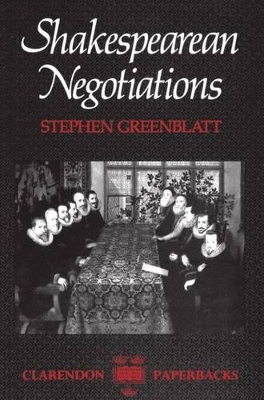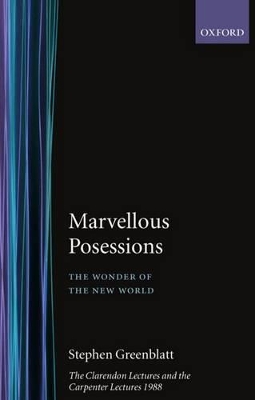Clarendon Paperbacks
2 total works
Stephen Greenblatt has been at the centre of a major shift in literary interpretation towards a critical method that places cultural creation in history. In this book - a sustained and powerful exemplification of this innovative method - he asks how collective beliefs and experiences are shaped, moved from one medium to another, concentrated in manageable form, and offered to the public on the stage. As well as giving us a new way of understanding Shakespeare's achievement, the book is an original analysis of a cultural process.
Shakespearean Negotiations provides significant insights into Henry IV and Henry V, Twelfth Night, King Lear, and The Tempest; it also includes fascinating analyses of such aspects of early modern culture as exorcism, cross-dressing, colonial propaganda, and martial law codes. It is, as well, a masterly example of a new critical method by its leading practitioner.
Shakespearean Negotiations provides significant insights into Henry IV and Henry V, Twelfth Night, King Lear, and The Tempest; it also includes fascinating analyses of such aspects of early modern culture as exorcism, cross-dressing, colonial propaganda, and martial law codes. It is, as well, a masterly example of a new critical method by its leading practitioner.
`And there I found very many islands filled with people innumerable, and of all of them I have taken possession for their highnesses, by proclamation made and with the royal standard unfurled, and no one contradicted me' - Christopher Columbus
Marvelous Possessions is a study of the ways in which Europeans of the late Middle Ages and the early modern period represented non-European peoples and took possession of their lands, in particular the New World.
In a series of innovative readings of travel narratives, judicial documents, and official reports, Greenblatt shows that the experience of the marvelous, central to both art and philosophy, was cunningly yoked by Columbus and others to the service of colonial appropriation. He argues that the traditional symbolic actions and legal rituals through which European sovereignty was asserted were strained to breaking-point by the unprecedented nature of the discovery of the New World. But the book
also shows that the experience of the marvelous is not necessarily an agent of empire: in writers as different as Herodotus, Jean de Lery, and Montaigne - and notably in Mandeville's Travels, the most popular travel book of the Middle Ages - wonder is the sign of a remarkably tolerant recognition of
cultural difference.
Marvelous Possessions is a study of the ways in which Europeans of the late Middle Ages and the early modern period represented non-European peoples and took possession of their lands, in particular the New World.
In a series of innovative readings of travel narratives, judicial documents, and official reports, Greenblatt shows that the experience of the marvelous, central to both art and philosophy, was cunningly yoked by Columbus and others to the service of colonial appropriation. He argues that the traditional symbolic actions and legal rituals through which European sovereignty was asserted were strained to breaking-point by the unprecedented nature of the discovery of the New World. But the book
also shows that the experience of the marvelous is not necessarily an agent of empire: in writers as different as Herodotus, Jean de Lery, and Montaigne - and notably in Mandeville's Travels, the most popular travel book of the Middle Ages - wonder is the sign of a remarkably tolerant recognition of
cultural difference.

